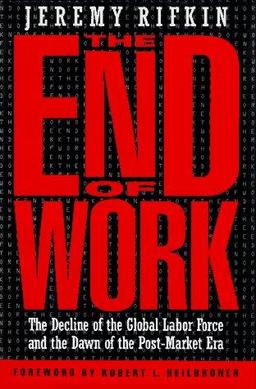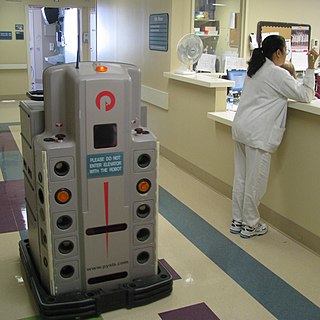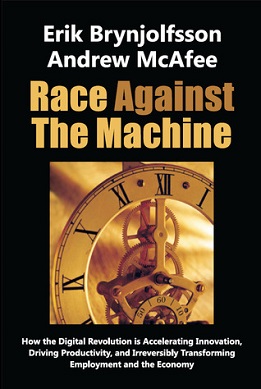
Marvin Lee Minsky was an American cognitive and computer scientist concerned largely with research of artificial intelligence (AI). He co-founded the Massachusetts Institute of Technology's AI laboratory and wrote several texts concerning AI and philosophy.

John McCarthy was an American computer scientist and cognitive scientist. He was one of the founders of the discipline of artificial intelligence. He co-authored the document that coined the term "artificial intelligence" (AI), developed the programming language family Lisp, significantly influenced the design of the language ALGOL, popularized time-sharing, and invented garbage collection.

Rodney Allen Brooks is an Australian roboticist, Fellow of the Australian Academy of Science, author, and robotics entrepreneur, most known for popularizing the actionist approach to robotics. He was a Panasonic Professor of Robotics at the Massachusetts Institute of Technology and former director of the MIT Computer Science and Artificial Intelligence Laboratory. He is a founder and former Chief Technical Officer of iRobot and co-Founder, Chairman and Chief Technical Officer of Rethink Robotics and currently is the co-founder and Chief Technical Officer of Robust.AI.

An AI takeover is a scenario in which artificial intelligence (AI) becomes the dominant form of intelligence on Earth, as computer programs or robots effectively take control of the planet away from the human species. Possible scenarios include replacement of the entire human workforce due to automation, takeover by a superintelligent AI, and the popular notion of a robot uprising. Stories of AI takeovers are popular throughout science fiction. Some public figures, such as Stephen Hawking and Elon Musk, have advocated research into precautionary measures to ensure future superintelligent machines remain under human control.
The productivity paradox, also referred to as the Solow paradox, could refer either to the slowdown in productivity growth in the United States in the 1970s and 1980s despite rapid development in the field of information technology (IT) over the same period, or to the slowdown in productivity growth in the United States and developed countries from the 2000s to 2020s; sometimes the newer slowdown is referred to as the productivity slowdown, the productivity puzzle, or the productivity paradox 2.0. The 1970s to 1980s productivity paradox inspired many research efforts at explaining the slowdown, only for the paradox to disappear with renewed productivity growth in the developed countries in the 1990s. However, issues raised by those research efforts remain important in the study of productivity growth in general, and became important again when productivity growth slowed around the world again from the 2000s to the present day.
Microsoft Research (MSR) is the research subsidiary of Microsoft. It was created in 1991 by Richard Rashid, Bill Gates and Nathan Myhrvold with the intent to advance state-of-the-art computing and solve difficult world problems through technological innovation in collaboration with academic, government, and industry researchers. The Microsoft Research team has more than 1,000 computer scientists, physicists, engineers, and mathematicians, including Turing Award winners, Fields Medal winners, MacArthur Fellows, and Dijkstra Prize winners.
The 'MIT Center for Digital Business' is an industry-funded research center headquartered at the MIT Sloan School of Management.

Stephen Malvern Omohundro is an American computer scientist whose areas of research include Hamiltonian physics, dynamical systems, programming languages, machine learning, machine vision, and the social implications of artificial intelligence. His current work uses rational economics to develop safe and beneficial intelligent technologies for better collaborative modeling, understanding, innovation, and decision making.

The End of Work: The Decline of the Global Labor Force and the Dawn of the Post-Market Era is a non-fiction book by American economist Jeremy Rifkin, published in 1995 by Putnam Publishing Group.
The AI effect occurs when onlookers discount the behavior of an artificial intelligence program by arguing that it is not "real" intelligence.

A technological revolution is a period in which one or more technologies is replaced by another novel technology in a short amount of time. It is a time of accelerated technological progress characterized by innovations whose rapid application and diffusion typically cause an abrupt change in society.

Andrew Yan-Tak Ng is a British-American computer scientist and technology entrepreneur focusing on machine learning and artificial intelligence (AI). Ng was a cofounder and head of Google Brain and was the former Chief Scientist at Baidu, building the company's Artificial Intelligence Group into a team of several thousand people.
Joshua Brett Tenenbaum is Professor of Computational Cognitive Science at the Massachusetts Institute of Technology. He is known for contributions to mathematical psychology and Bayesian cognitive science. According to the MacArthur Foundation, which named him a MacArthur Fellow in 2019, "Tenenbaum is one of the first to develop and apply probabilistic and statistical modeling to the study of human learning, reasoning, and perception, and to show how these models can explain a fundamental challenge of cognition: how our minds understand so much from so little, so quickly."

Technological unemployment is the loss of jobs caused by technological change. It is a key type of structural unemployment. Technological change typically includes the introduction of labour-saving "mechanical-muscle" machines or more efficient "mechanical-mind" processes (automation), and humans' role in these processes are minimized. Just as horses were gradually made obsolete as transport by the automobile and as labourer by the tractor, humans' jobs have also been affected throughout modern history. Historical examples include artisan weavers reduced to poverty after the introduction of mechanized looms. During World War II, Alan Turing's bombe machine compressed and decoded thousands of man-years worth of encrypted data in a matter of hours. A contemporary example of technological unemployment is the displacement of retail cashiers by self-service tills and cashierless stores.

Race Against the Machine is a non-fiction book from 2011 by Erik Brynjolfsson and Andrew McAfee about the interaction of digital technology, employment and organization. The full title of the book is: Race Against the Machine: How the Digital Revolution Is Accelerating Innovation, Driving Productivity, and Irreversibly Transforming Employment and the Economy.

Andrew Paul McAfee is a principal research scientist at MIT and cofounder and codirector of the MIT Initiative on the Digital Economy at the MIT Sloan School of Management. He studies how digital technologies are changing the world.

Terah Lyons is known for her expertise in the field of artificial intelligence and technology policy. Lyons was the executive director of the Partnership on AI and was a policy advisor to the United States Chief Technology Officer Megan Smith in President Barack Obama's Office of Science and Technology Policy.

James M. Manyika is a Zimbabwean-American academic, consultant, and business executive. He is known for his research and scholarship into the intersection of technology and the economy, including artificial intelligence, robotics automation, and the future of work. He is Google's first Senior Vice President of Technology and Society, reporting directly to Google CEO Sundar Pichai. He focuses on "shaping and sharing" the company's view on the way tech affects society, the economy, and the planet. In April 2023, his role was expanded to Senior Vice President for Research, Technology & Society and includes overseeing Google Research and Google Labs and focusing more broadly on helping advance Google’s most ambitious innovations in AI, Computing and Science responsibly. He is also Chairman Emeritus of the McKinsey Global Institute.

Louis Barry Rosenberg is an American engineer, researcher, inventor, and entrepreneur. He researches augmented reality, virtual reality, and artificial intelligence. He was the Cotchett Endowed Professor of Educational Technology at the California Polytechnic State University, San Luis Obispo. He founded the Immersion Corporation and Unanimous A.I., and he wrote the screenplay for the 2009 romantic comedy film, Lab Rats.

Karin Janel Kimbrough is an American economist and Chief Economist at LinkedIn. She serves on the board of directors at Fannie Mae, and has previously worked at Google and Bank of America. She was named one of the world's most Powerful Women in Business in 2017.















